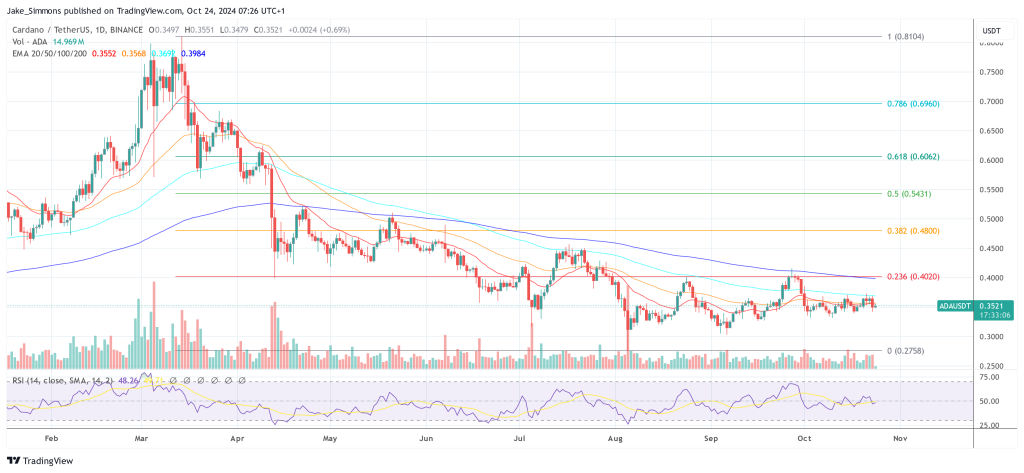
Charles Hoskinson, the founder of Cardano, has revealed what his discussions with Argentina’s President Javier Milei during his visit to Buenos Aires for the Cardano Summit and Tech Forum Argentina were about. In an exclusive interview with La Nación, Hoskinson outlined his vision for Argentina as a burgeoning technological hub for Latin America, aligning with the country’s new political direction.
Cardano: Hoskinson Shares Strategy For Argentina
“We had a brief meeting after the Tech Forum Argentina, but this is just the beginning,” Hoskinson revealed regarding his encounter with President Milei. “The next step is to talk to people around him, like the Minister of Deregulation [Federico Sturzenegger], to better understand what the Argentine government really wants to do with blockchain.”
Hoskinson acknowledged the complexities arising from Milei’s libertarian policies. “The challenge for me, and I think for many of us in the industry, is that we hear two things at the same time that are somewhat contradictory,” he explained. “One thing is that Argentina is open for business, seeking ways for blockchain and the government to work together. But then we hear Milei saying, ‘Let’s get rid of the government.’ They just eliminated the AFIP (tax agency), right? So how do you make a deal with the government if the intention is to move everything to the free market?”
Emphasizing the importance of collaboration, Hoskinson stated, “We want to get the government and private industry together, companies like Globant, Mercado Libre […] to try and have both sides draft a document for a Digital Argentina 2030 and decide what the expectations should be for how Argentines interact with their government.”
He highlighted the necessity for stability beyond political terms. “There must be stability, and it shouldn’t be tied to a specific president or political philosophy,” he said. “Because in elections, things change, and you don’t want to spend two or three years building something that the next regime dismantles.”
Hoskinson expressed optimism about Argentina’s future. “If they survive and get to the other side, Argentina will be one of the easiest markets to do business in, invest in, hire people, and innovate,” he asserted. “I think it’s very fertile ground for blockchain technology to survive and thrive.”
He also noted the significant presence of cryptocurrencies in the country. “If you look at the distribution of cryptocurrencies, there are about $100 billion in crypto assets in Argentina, while the GDP is $700 billion,” Hoskinson explained. “That means that approximately one out of every seven dollars of GDP value is in cryptocurrencies.”
Detailing his company’s plans, the Cardano founder said, “At the very least, we are going to hire people because there are many excellent developers. It’s part of the memorandum of understanding we signed with Globant, a company with 30,000 developers, and we will use part of that talent to develop some of our software.” He sees Argentina as a gateway to the broader Latin American market. “We are considering that Argentina could be a hub to reach Paraguay, Colombia, Ecuador, or Peru,” he added.
Hoskinson contrasted Argentina’s direction with other countries in the region. “In the region, things are moving very unproductively for many countries. Communists have been elected in Peru and Chile, and Brazil has a far-left government,” he observed. “What ends up happening is that these governments tend to confiscate property and destroy direct and foreign investment, raise taxes, and create a completely unpleasant environment for business operations.”
He believes Argentina is moving “in the opposite direction, embracing market freedom. It could become like South Africa to the rest of Africa, becoming the stable gateway for doing business across the continent.”
Hoskinson commended Milei’s proactive approach to early adoption of emerging technologies. “Milei understands this, and that’s why he talks to Elon Musk, travels to Silicon Valley, and proactively tries to attract some of these industries to Argentina,” Hoskinson noted. “If they can get in early enough, both regionally and globally, they can become a significant hub.”
Looking toward the future, Hoskinson outlined Cardano’s objectives. “Globally, Cardano’s goal is always to improve its core principles. Be smarter, more decentralized, more useful, always at the forefront of decentralization,” he explained. “We want that when a company wants to build a decentralized Facebook, a voting system for a country, or a new currency, they consider Cardano as the place to do it.”
He expressed enthusiasm for Argentina’s transformative phase. “In all this chaos of things happening, there is a great transformation and social change,” Hoskinson said. “They are at the forefront of a completely new social movement and governance. If they make the right decisions, like Japan did, in 20 years, they will be one of the largest economies in the world and the gateway for all of South America.”
At press time, Cardano traded at $03521.



















